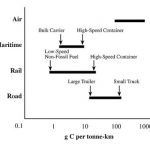Velocys: A Key To Advanced Biofuels At Scale
Jim Lane Four new technologies approach scaled operations, all with one element in common – Velocys (VLS.L) technology on the back-end. Why Velocys, why now? The Digest investigates. In Oklahoma, Southeast Oregon, Eastern Ohio, and a site near London we’re about to see the commercial-scale debut of Velocys technology, a smaller scale gas-to-liquids processing technology that converts natural gas or biomass into premium liquid products, such as diesel and jet fuel. In this case, specifically designed for smaller scales, resulting in standardized modular plants that are economic, easier to ship and faster to install, at lower risk,...
Gevo Soars: The Story Behind the Rise
by Jim Lane
What in the world has gone right with Gevo?
For years now, Gevo (Nasdaq:GEVO) has remained true to a vision of low-carbon, advanced renewable fuels, when so many others pivoted away to the world of ABF — Anything But Fuels. Some tried chemicals, cannabis, algae, natural gas, nutraceuticals, vegan foods — lately, protein has been all the rage. Gevo was one of the few true believers and paid the price of stock price punishment and near-extinction, for years.
While they weathered a debilitating patent battle with DuPont, until it settled and DuPont imploded. And the collapse of oil prices...
North American Outlook on Biofuels Challenges and Opportunities
Challenges and Opportunities in Biofuels
By Steve Hartig, Former VP of Technology Development at ICM
The North American biofuels market can be split into three main segments all of which have major dynamics. What I would like to do is give a high-level overview of what I see as some of both the challenges and opportunities across these.
Ethanol which is a produced from corn and sorghum in about 200 plants mainly across the Midwest and blended at about 10% with gas. Majors such as POET, Green Plains, Flint Hills, Valero, ADM and Cargill do a bit more than half of the 16...
Corn Fractionation Improving Ethanol Production
Ethanol and isobutanol producer Gevo, Inc. (GEVO: Nasdaq) is installing equipment in its Luverne, Minnesota plant to improve efficiency in corn processing. The company is leasing a proprietary corn fractionation or slicing process developed Shockwave, LLC based in DesMoines, Iowa. The new equipment is intended to increase by-product output, including feed protein products and food-grade corn oil. With sales of more valuable by-products Gevo expects to improve overall profit margins. Shareholders can expect to see results after the first quarter 2019, when the equipment installation is expected to be complete.
Shockwave keeps a low profile with no corporate website and no one to answer phone calls. However,...
Conversions To Renewable Diesel
by Helena Tavares Kennedy
The seasons are changing in many parts of the world right now, but what really is changing this autumn is how the world is looking at renewable diesel. Phillips 66 and REG’s announcement about a new renewable diesel plant on the U.S. West Coast planned for 2021 comes after a notable increase in refineries that are being converted and changed over to renewable diesel. Change is good, especially in this case.
As Bob Dylan sang, “For the loser now, Will be later to win, For the times they are a-changin’.” And who knew he was singing about the RFS...
The Best Peak Oil Investments, Part IV: Gas-, Biomass-, and Coal-to-Liquids
Tom Konrad CFA There are many proposed solutions to the liquid fuels scarcity caused be stagnating (and eventually falling) oil supplies combined with growing demand in emerging economies. Some will be good investments, others won't. Here is where I'm putting my money, and why. This fourth part takes a look at the possibility of converting coal, natural gas or Biomass into gasoline or diesel we can use in unmodified vehicles. In the first three parts of this series, I looked at various substitutes for oil based transportation fuels: Biofuels and Biochemicals Vehicle Electrification...
Rentech Retrenches
by Debra Fiakas CFA Clean energy solution provider Rentech, Inc. (RTK: NYSE) is scheduled to report second quarter 2012 results the first week in August. Usually the seasonally strong period, this year the June quarter has shareholders sweating. That is because the warm weather conditions sent farmers out into fields earlier than usual to prepare fields. Orders for fertilizer products from Rentech’s East Dubuque, Iowa facility were coming even before the end of the March quarter. The net effect was to pull sales forward. The question now is whether June will now present...
EPA Reneges on Trump’s Biofuels Deal
by Jim Lane
“EPA Reneges on Trump’s Biofuels Deal”, said the Iowa Renewable Fuels Association in reacting to the US Environmental Protection Agency’s new plans for fulfilling federal renewable fuel requirements. EPA released a proposed supplemental rule for the Renewable Fuel Standard today, and the bioeconomy is up in arms, and the outrage is centered in farm country, once a Trump bastion of support.
“IRFA members continue to stand by President Trump’s strong biofuels deal announced on Oct. 4, which was worked out with our elected champions and provided the necessary certainty that 15 billion gallons would mean 15 billion gallons, even after...
Aviation Biofuels: The Year of the Tree
by Jim Lane
When the world’s leaders for sustainable aviation fuels have a general meeting the week before the COP24 global climate sessions (this year in Poland), you can bet that the focus will be breaking the “You Can Have Two out of Three Conundrum” of aviation fuels. Which is to say: affordable, available at scale, and sustainable, pick any two of the three.
Fossil fuels are (usually) affordable and always available at scale. Sustainable jet fuels that are available at scale have generally not been affordable to date, and affordable sustainable fuels have been mostly explored at bench scale, so...
Making Cash From Rice Trash
by Jim Lane
In our three-part series this month on utilizing waste resources, we’ll turn to rice straw, which is a major headache for Chinese and Indian emissions. Praj and Gevo are working hard on perfecting a technology to address this.
Specifically, in the past month, Gevo (GEVO) also executed an agreement with Praj to develop jet fuel and isooctane from rice straw and other feedstocks. Gruber noted that “we believe this second-generation technology combination has great potential to address India’s rice straw burning problem and related air pollution, while generating low-carbon hydrocarbons for jet fuel and gasoline. Praj is a leader...
REG Enters Renewable Diesel With Syntroleum Purchase
Jim Lane In Oklahoma, and Iowa, Renewable Energy Group (REG; NASD:REGI) announced that it would acquire substantially all of the assets of Syntroleum Corporation (NASD:SYNM), and assume substantially all of the material liabilities of Syntroleum, for 3,796,000 shares of REG common stock worth $40.08 million at today’s market close. The purchase price subject to reduction in the event that the aggregate market value of the REG common stock to be issued would exceed $49 million or if the cash transferred to REG is less than $3.2 million). “This will help us grow our advanced biofuel business, enhance our intellectual...
Aviation Biofuel Overview
by Debra Fiakas, CFA
The aviation industry contributes about $2.7 trillion to the world’s gross domestic product. It may seem like a big number, but that is only 3.6% of the world’s wealth. Aviation may be a minor player in terms of creating wealth, it is a big culprit in climate change. Flying around the world accounts for as much as 9% of humankind’s climate change impact. Indeed, compared to other modes of transportation, flight has the greatest climate impact.
The negative impact of carbon emitted by aircraft is made even worse by the fact that the emissions point is mostly at cruising altitudes high...
The Low Sulfur Diesel Crisis of 2020 And How To Prevent It
“The global economy likely faces an economic crash of horrible proportions in 2020, not for want of a nail but want of low-sulfur diesel fuel,” writes renowned energy analyst Phil Verleger in a note this month titled “$200 Crude, the Economic Crisis of 2020, and Policies to Prevent Catastrophe”. Not good timing for a White House re-election effort if, as expected, the blame falls on lack of preparedness in the 2017-2020 run-up to the projected crisis..
It’s a dire scenario but there’s hard data behind it, and though few go as far as Verleger, almost every expert is warning of a...
Rentech After Fischer-Tropsch
by Debra Fiakas CFA A long article appearing in early March 2014 on Biofuels Digest about Emerging Fuels Technology (EFT) gave me pause. The article has since been removed from the site but it was an interesting primer on Oklahoma-based EFT’s use of the Fischer-Tropsch process to convert carbon-based feedstock to liquid fuel, otherwise called Gas-to-Liquids. While Emerging Fuels Technology has been listed in Crystal Equity Research’s Alternative Chemicals Group of the Beach Boys Index of companies trying to harness energy from the sun through biomas, I must admit the company had not been taken seriously. ...
Linc Energy: Making Synthetic Crude From Coal Downunderground
by Debra Fiakas CFA Gas-to-liquids is back on my radar screen after an article appearing in early March 2015 on Biofuels Digest described progress Emerging Fuels Technology (EFT) has made in perfecting the Fischer-Tropsch process to convert carbon-based feedstock to liquid fuel, otherwise called Gas-to-Liquids. Fischer-Tropsch often referred to as FT for short is a series of chemical reactions to convert carbon monoxide and hydrogen into liquid hydrocarbons. The reactions are triggered by a catalyst, usually cobalt or iron, and managed under high temperatures in a chamber or reactor. Some might consider it a neat trick...
Biofuels & Biobased Earnings Roundup: Gevo
by Jim Lane
The Top Line. In Colorado, Gevo (GEVO) reported Q2 revenues of $9.4 million compared with $7.5 million in the same period in 2017. During the second quarter of 2018, revenues derived at the Luverne Facility related to ethanol sales and related products were $8.8 million, an increase of approximately $2.0 million from the same period in 2017. This was primarily a result of increased ethanol production and distiller grain prices in the second quarter of 2018 versus the same period in 2017. Non-GAAP cash EBITDA loss in the three months ended June 30, 2018 was $2.6 million, compared...












